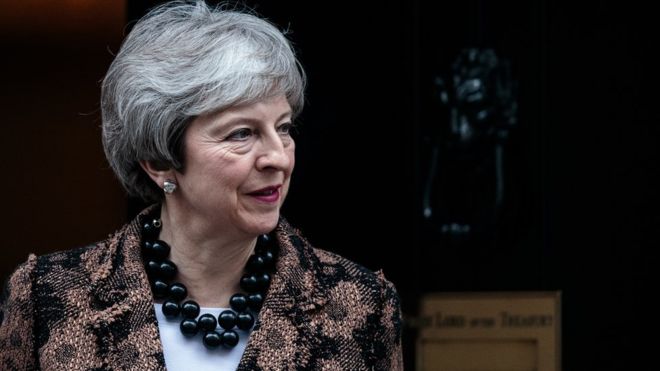
Theresa May will hold Brexit talks with Northern Ireland's five main political parties at Stormont later.
The PM is on a two-day visit to try to reassure people she can secure a Brexit deal that avoids the return of customs checkpoints on the Irish border.
On Tuesday, she told business leaders she wanted changes to the controversial backstop plan to prevent this but indicated she did not seek to scrap it.
Meanwhile, Irish PM Leo Varadkar will meet EU leaders in Brussels.
The talks come before Mrs May is due to meet European Commission President Jean-Claude Juncker on Thursday in an effort to secure changes to her Brexit deal.
The EU has maintained it will not renegotiate the withdrawal agreement, including the backstop.
Mrs May is due to spend Wednesday morning meeting the political parties.
BBC Ireland correspondent Chris Page said: "The Stormont parties will give the prime minister two very different messages about the backstop.
"Sinn Fein has said her plan to ask the EU for legally binding changes is a huge act of bad faith. But the DUP says the current backstop proposal is unacceptable."
Where are we with the backstop?
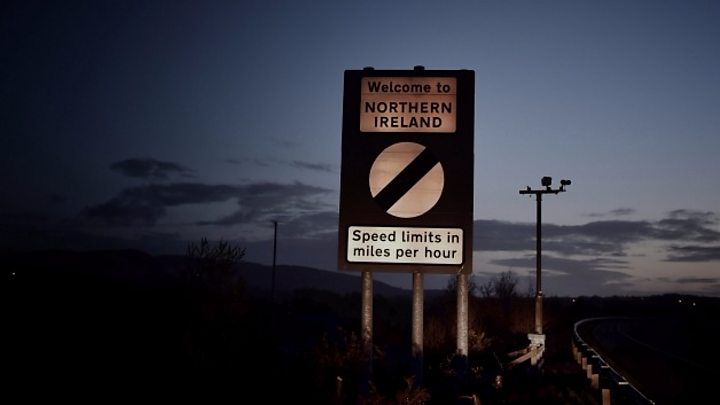
The backstop is a commitment to avoid physical barriers or checks on the border between Northern Ireland and the Republic of Ireland, if no UK-EU trade deal is agreed before the Brexit transition period ends.
Many people fear the return of customs checks would put the peace process at risk.
In Tuesday's speech in Belfast, Mrs May said: "There is no suggestion that we are not going to ensure in the future there is provision for this insurance policy... the backstop."
However, she indicated she would seek changes to address concerns raised by MPs about its "potential indefinite nature" when they overwhelmingly rejected her Brexit deal.
Last week, MPs voted for an amendment tabled by Conservative grandee Sir Graham Brady - and backed by the PM - which "requires the Northern Ireland backstop to be replaced with alternative arrangements to avoid a hard border".
Many fear the "temporary single customs territory" created under the backstop plan would keep Britain tied to EU rules in the long term.
Downing Street has insisted the government is still considering alternatives.
What could the UK offer as possible backstop 'alternatives'?
On Wednesday, the Alternative Arrangements Working Group, comprised of Leave and Remain MPs, will conclude three days of talks aimed at finding other Brexit options that would avoid a hard border.
MPs have been looking at "alternative arrangements" to the backstop, which Mrs May has said she will discuss with EU leaders. They include:
- a "trusted trader" scheme to avoid physical checks on goods flowing through the border
- "mutual recognition" of rules with the EU
- "technological" solutions
The UK is due to leave the EU at 23:00 GMT on Friday 29 March, when the two-year limit on withdrawal negotiations enforced by the Article 50 process expires.
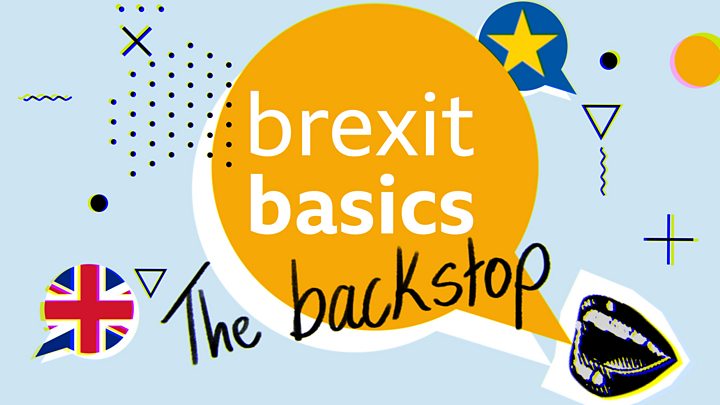
Confused by Brexit jargon? Reality Check unpacks the basics
If MPs approve a deal with Brussels, the parties will then have until the end of 2020 to negotiate a future trade deal. If that is not in place by the end of this transition period, the backstop kicks in.
Without a deal, however, there would be no backstop and no transition period.
The prime minister has said she is "determined" to deliver Brexit on time, but a number of cabinet ministers have indicated they would be willing to agree to a short extension to finalise legislation for Brexit.
Who is the PM meeting on Wednesday?
Mrs May will head to Stormont House to have bilateral meetings with Stormont's five biggest political parties:
- The Democratic Unionist Party (DUP) - the Conservative Party's confidence-and-supply partner at Westminster
- Sinn Féin
- SDLP
- Ulster Unionist Party (UUP)
- Alliance Party
Two deadlocks are likely to be on the agenda: Brexit and the lack of a Northern Ireland Assembly.
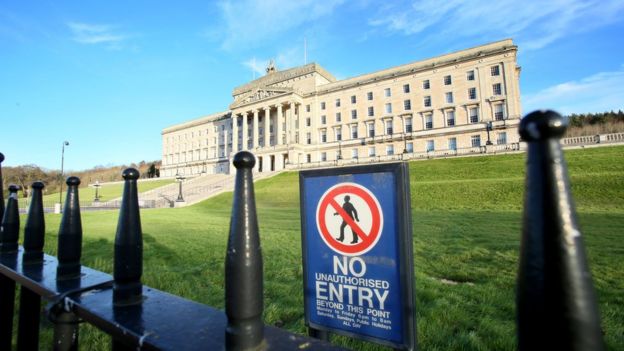 Image copyrightPAUL FAITH
Image copyrightPAUL FAITH
There has been no functioning devolved Northern Ireland government since January 2017, after a row between the DUP and Sinn Féin collapsed the power-sharing executive.
For almost 10 years before that, the DUP and Sinn Féin worked together in government under a system of mandatory coalition, where unionist and nationalist parties shared power.
The government collapsed after Sinn Féin's Martin McGuinness resigned as deputy first minister, citing the DUP's conduct around a flawed energy scheme, the Renewable Heat Incentive (RHI).
- Criticism as Stormont stalled two years on
- What caused the Stormont stalemate?
- Who's calling the shots on NI policy?
- What is the Good Friday Agreement?
It sparked a snap election, but since then, various talks processes have collapsed and the Northern Ireland Secretary Karen Bradley had to take control of financial matters and pass its budget bills through Westminster.
Varadkar in Brussels
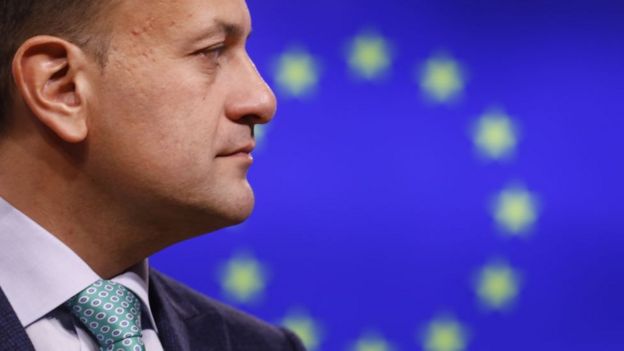 Image copyrightGETTY IMAGES
Image copyrightGETTY IMAGES
Taoiseach (Irish prime minister) Leo Varadkar will hold discussions with EU Commission President Jean-Claude Juncker on Wednesday.
He is also meeting EU Council President Donald Tusk and the EU Parliament's Brexit negotiator Guy Verhofstadt during his visit.
The pair will talk about the Republic of Ireland's preparations for a no-deal outcome.
Mrs May is due to travel to Brussels on Thursday, for her first face-to-face talks in Brussels since the Withdrawal Agreement reached last November was rejected by MPs in January.
The Irish government has already begun to implement its no-deal plans, with Mr Varadkar saying he still believes it is unlikely to happen but that his government must be prepared for every possibility.
Both Ireland and the wider EU have refused to soften their stances, and insist there can be no re-negotiation of the withdrawal agreement.
BBC News

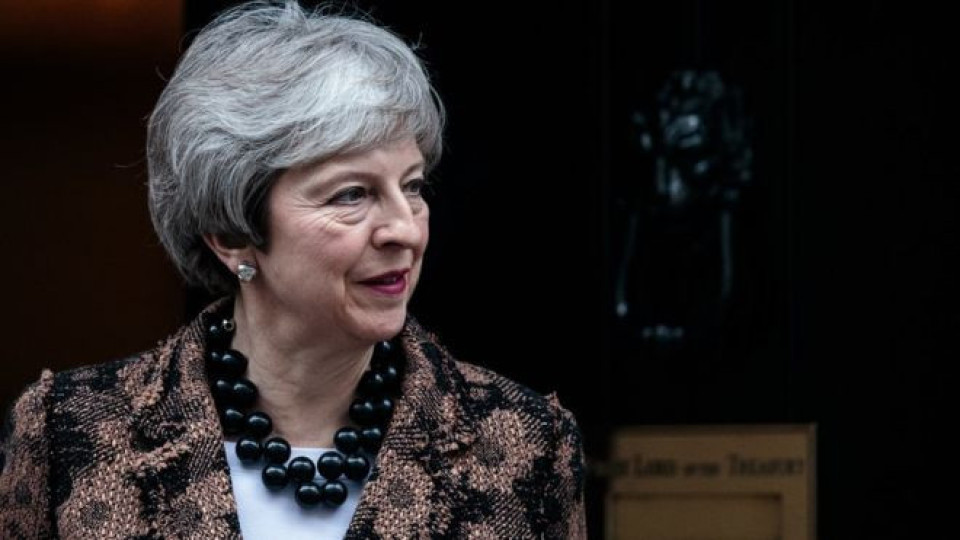
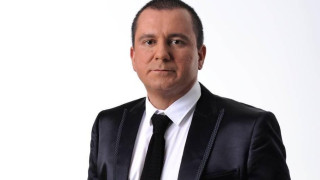
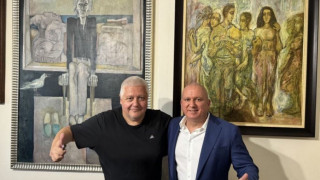
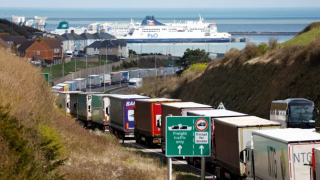

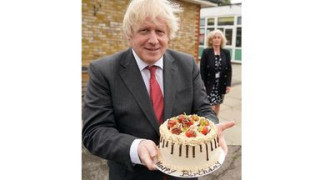




Leave a comment